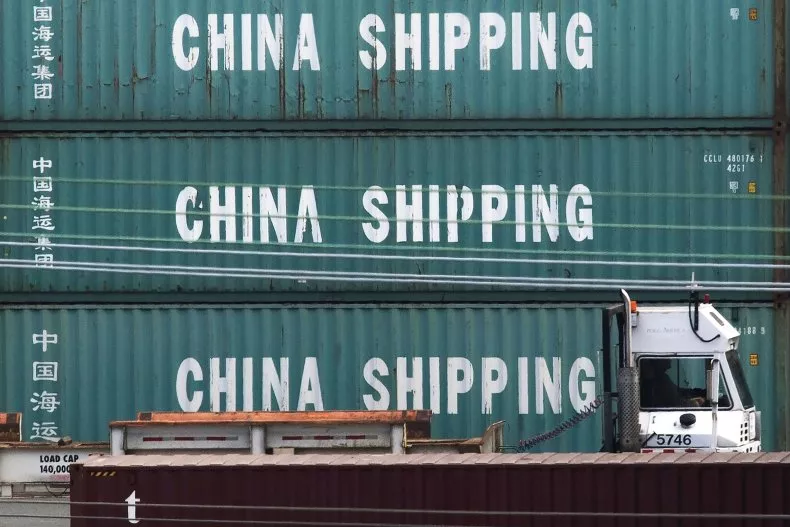🇺🇸🇨🇳 Tariffs alone won’t hit China and won’t rebuild the United States industry – Phillip Pilkington‼️
It seems that one of the defining American presidential elections in recent history is underway. Both sides see it as an existential struggle for the heart of America. One aspect of this struggle is the signal from the Trump campaign that it is moving towards aggressive trade protectionism, with Donald Trump calling himself a “member.” But while America struggles to define itself at home, the world is changing in a more dramatic way than anything we have seen since the end of the Cold War or perhaps the end of World War II.
As the first Trump administration began in 2016, America began to rethink its free trade policy since the fall of the Berlin Wall. In parallel, the United States imposed numerous sanctions on the Chinese economy in the hope of preserving its technological advantage. In response, the Chinese accelerated the pace of their own technological development, culminating in the release of the Huawei Mate 60 smartphone, which featured the first domestically produced Chinese processor, the Kirin 9000.
These trends are closely related. Changes in the world order, America turning towards protectionism, and trade wars between America and China can be traced back to the misguided direction of global trade since the 1990s. Between the 1980s and mid-1990s, the world economy’s trade imbalances fluctuated around 1 percent of global GDP. By the mid-2000s, due to the aggressive globalization, they had roughly doubled and have since remained at a high level.
These trade imbalances explain everything from China’s rapid rise to the hollowing out of American manufacturing. These are real problems, and the Trump campaign correctly points them out. The question, however, is whether raised tariffs and protectionism are the best way to address this imbalance.
Here the Trump campaign platform is struggling with two major issues.
The first is that it overestimates what protectionism can achieve. The key lies in the name – its aim is to “protect” domestic industries. Tariffs can help protect domestic industries, but some American political circles seem convinced that imposing tariffs will also lead to a spontaneous resurgence of industries lost to globalization. Many of these industries are highly complex and require skills, know-how, transportation infrastructure, and other investments that take years, or even decades, to cultivate and develop. If the American government imposes tariffs on key sectors, and American businesses have difficulty replacing the goods targeted by tariffs, the result will simply be a steep rise in the price of goods.
This leads us to the second issue. Trump’s campaign signaled a desire for aggressive cuts in taxes, especially income taxes. Such austerity would drastically increase the average American consumer’s purchasing power. However, if the government restricts access to cheap foreign goods with higher tariffs, then too much money will be chasing too few goods. This is the recipe for inflation – possibly very high inflation. If Trump is elected, part of it will be due to the cost of living that Americans experience during the Biden era; if a second Trump administration continues its own inflationary policies, then its support will quickly evaporate.
However, there is an alternative. The Hungarian Foreign Institute released a comprehensive report this week arguing for a different approach to America’s – and, by extension, the world’s – economic problems. Instead of returning to the tariff policy that saw minimal success in the 1930s, we propose dusting off the innovative policy idea raised at the 1944 Bretton Woods Conference, which created the post-war monetary and economic system. This proposal is known as the “bancor”.
💰 The bancor was an international currency formulated by John Maynard Keynes and EF Schumacher between 1940 and 1942, which the United Kingdom proposed to introduce after World War II.
This newly created supranational currency would then be used as a unit of account in international trade within a multilateral settlement system – the International Clearing Union – which would also need to be established.
John Maynard Keynes suggested an explanation for the ineffectiveness of monetary policy in combating the great economic depression, interpreting the depression non-monetarily, and eventually proposing an alternative monetary policy to handle the crisis. Keynes believed that in times of severe unemployment, interest rates could not be reduced through monetary policy. The ability of capital flows to seek the highest interest rates between countries thwarted Keynesian policy. Through tighter government control of international trade and fund movements, Keynesian policy would more effectively stimulate individual economies.
The Bancor would not be an international currency. Instead, it would be an accounting unit used to track the flow of assets and liabilities internationally, executed through the International Clearing Union. Gold could be exchanged for bancor, but bancor could not be exchanged for gold. Individuals could not hold bancor or trade it. All international trade would be valued and settled in bancor. Both surplus countries with excessive bank assets and deficit countries with excessive bank liabilities would be charged to encourage them symmetrically to take action to restore balanced trade.
Every item exported by a member country would credit their bancor to their ICB account, and every item imported would debit it. They would limit the amount of bancors a country could accumulate if it sold more abroad than it bought and the amount of bank debt it could accumulate if it bought more than it sold. This was to prevent countries from running excessive surpluses or deficits. The borders of each country would be proportionate to their share of world trade…
After crossing the initial limits, countries with deficits could devalue, and countries with surpluses could revalue their currency. This would make deficient rural goods cheaper and surplus rural goods more expensive, to encourage the restoration of trade balance. Further violations of the bank deposit or credit position would trigger mandatory action.
For chronic debtors, this would include mandatory currency revaluation, increasing interest payments into the ICB reserve fund, forced gold sales, and capital export restrictions.
For chronic creditors, this would involve currency revaluation and at least a 5 percent interest after surplus credits, escalating to 10 percent for larger surpluses into the ICB reserve. Keynes never believed that creditors would actually pay the actual penalty; instead, he believed they would take the necessary steps… to avoid them.
📝 Phillip Pilkington : In 1944, the United States rejected the Bancor plan because it generated large trade surplus – its benefits are now clear for America: managed free trade is the best opportunity to rebalance the country’s economy and rebuild its domestic industry. But what about China, which, like the United States in 1944, benefits from the uncontrolled system? The report argues that it is strongly in China’s interest to avoid a trade war with the United States. Signing the bancor proposal would impose a short-term penalty on China, but in the long run, the balanced global system it creates could enable the prosperity of China and the United States.
💘Love
💘Love
😡Angry
😡Angry




